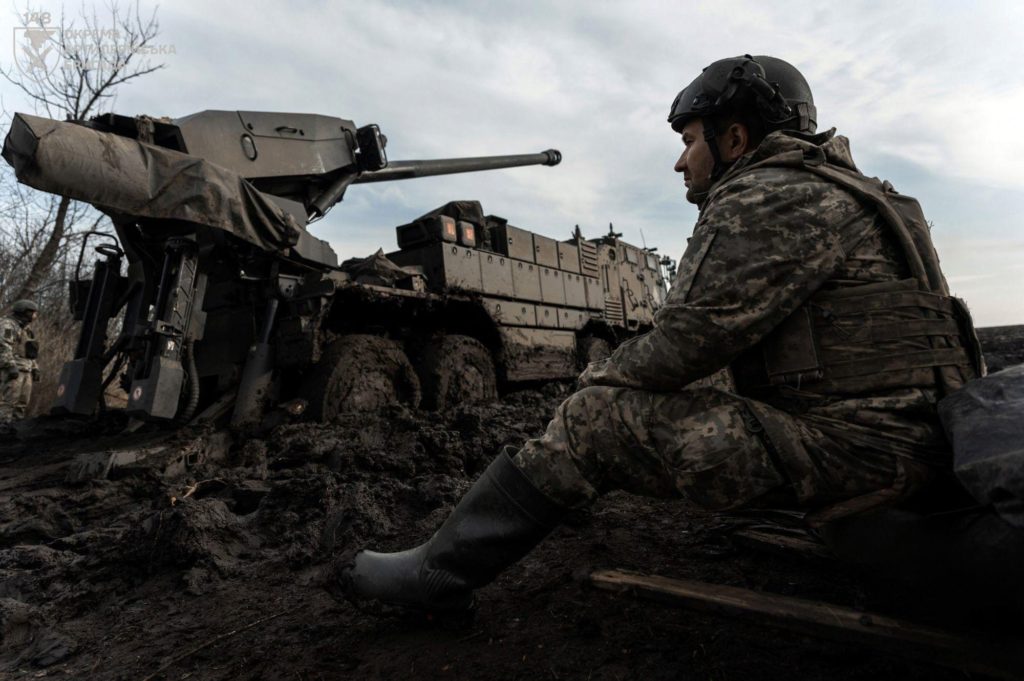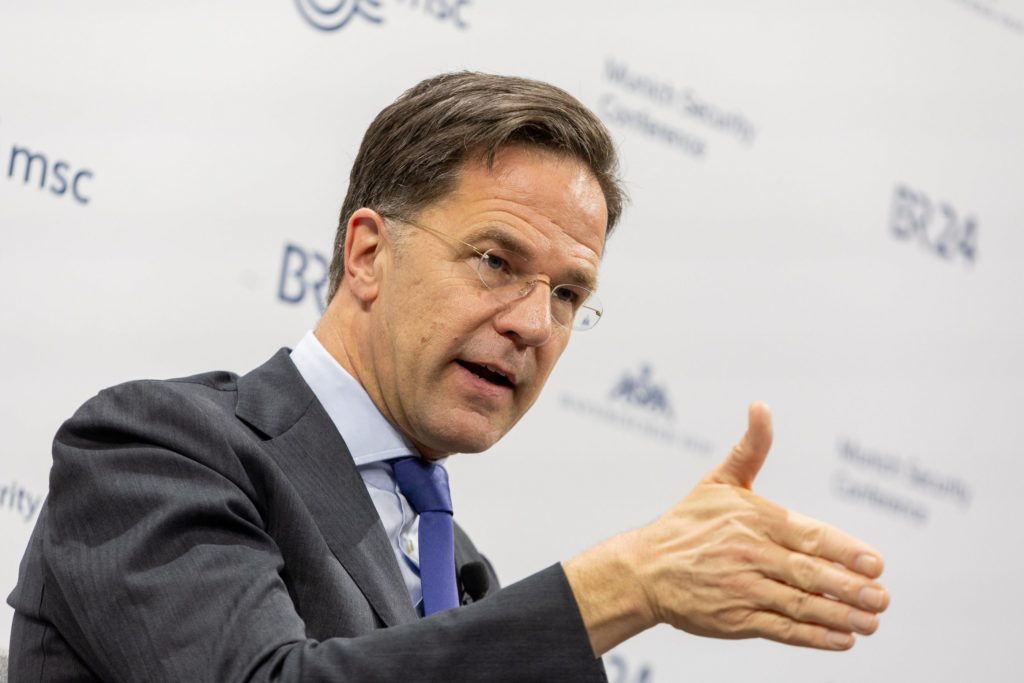The 60th Munich Security Conference, bringing together key political leaders from around the world, was held in Germany on the eve of the second anniversary of Russia's full-scale invasion of Ukraine.
While verbal commitments to support Ukraine remain steadfast among Western allies, the tone of the discussions has tangibly shifted.
Last year, Ukraine dominated the conversations and communiques out of Munich. This year, however, there is a pronounced sense that resolve to ensure Ukraine's victory has waned among Western partners. Politicians on both sides of the Atlantic are now portraying the current deadlock as a victory, citing Western assistance in liberating half of the Ukrainian territory initially captured by Russia.
Rather than announcing augmented, unconditional support to enable Ukraine to prevail, much of the rhetoric centered on diffusing security efforts globally instead of maintaining concentrated resistance to Putin's aggression.
The conference agenda revealed Ukraine fading into the backdrop, with issues surrounding Israel, China, the United States, and the Global South appearing equally, if not more pressing, to participants. Even the annual Munich Security Report did not have a distinct section on Ukraine, characterizing Russia's assault as part of a broader global disorder and conflict.
The conference's official motto "Lose-lose?" belied the conference organizers’ overall pessimism: victory was framed as impossible in the global growing Gordian knot of problems. However, this logic of common defeat only suits some of the participants.
Euromaidan Press analyzes the messages about and from Ukraine resonating out of the Munich Security Conference.
Mixed messages from America
A large American delegation led by Vice President Kamala Harris arrived in Munich. She held a separate meeting and joint press conference with the Ukrainian President.

However, Harris dedicated minimal time in her speech to Russia’s war on Ukraine. There were no positive messages about further support or victory. On the contrary, there was a hint that Ukraine had already achieved its main triumph by defending Kyiv in 2022.
The list of pre-approved questions for Harris also excluded Ukraine. Similarly, Secretary Blinken omitted the topic from his priorities.
America's caution likely stems from uncertainty about whether Congress will approve Ukraine's $60 billion financial aid. Harris confirmed there's no Plan B if the lawmakers fail to greenlight the package.
“There’s only Plan A, which is to ensure that Ukraine receives what it needs,” she said.
However, this seems unconvincing. There was ample scope for firm support assurances, which US leadership declined to provide.
Per European Pravda sources, American officials assured their Ukrainian counterparts that eventual military aid package approval seems probable. However, the macro-financial component may be removed. Ukraine appears to be preparing for this outcome.
“I’m often asked what happens without US military and financial backing. My answer is Ukraine will win regardless. Because Europe must win. Europe cannot lose. This is the signal I’ve heard in recent days,” remarked Deputy Prime Minister Olga Stefanishyna, also in Munich.
Shadow of World War looms
Despite unclear prospects for further US assistance, Vice President Harris acknowledged the US is seriously evaluating the possibility of Russia expanding the war into NATO countries.
"History shows if we don't respond when an aggressor invades its neighbor with impunity, they will continue advancing. In Putin’s case, it means all of Europe is under threat," she explained.
Meanwhile, American historian Timothy Snyder stated that World War III has already begun, albeit in a fragmented form, leading many to deny its existence.
"It's a strange international war impacting Europe, North America, and Asia, with fighting only in one country's territory. By many measures, it's a world war where resistance is mounted by just one nation," Snyder said.
Former US Secretary of State Hillary Clinton, who also attended the Munich Conference, concurred with Snyder.
"We remember past wars and wish to avoid repeating history. So, we resist acknowledging the realities before our eyes. However, we must. We need to determine how we will respond to the existential crisis that is a world war," Clinton summarized.

Avdiivka bell rings hollow
On the conference's second day, the Ukrainian issue resurfaced for all when Ukrainian forces reported abandoning Avdiivka, Donetsk Oblast, after four months of relentless Russian assaults.

Even those downplaying Russia’s war and its consequences had to revisit the Ukrainian issue. Russia secured its first major victory since taking Bakhmut in May 2023, enabled by weapons deficits in Ukraine's military, Zelenskyy explained. Ukraine urgently requires artillery, air defenses, and long-range missiles, otherwise Kyiv’s battlefield gains risk being negated.
"Don't ask Ukraine when the war will end. Ask yourselves why Putin can still wage it," Zelensky appealed to partners.
Scholz signals resolve to back Kyiv
German Chancellor Scholz dedicated nearly his entire speech to Ukraine, a first among top conference participants. He termed Russian aggression the prime security threat, acknowledging the West's insufficient military support for Ukraine. Berlin is sharply hiking defense spending, including Ukraine aid, to change this.
"Germany will invest over 2% of GDP on defense this year, next year, and for years ahead – in the 2020s, 2030s and beyond," Scholz pledged.
Therefore, Kyiv will soon receive a €1.1 billion German defense package, reaching €7.1 billion by the end of 2024. While not directly acknowledged, Germany appears to be stepping in to make up for uncertain military aid from the US.

Yet once more, Scholz deflected the pressing question of when Ukraine might receive German-made long-range Taurus missiles, which can penetrate far behind Russian lines.
Danish PM demands Europe aid Ukraine
Danish Prime Minister Mette Frederiksen emerged as a leading voice of Munich discussions, acknowledging to Volodymyr Zelenskyy Europe’s deficient urgency in aiding Ukraine. She vowed to provide immediate assistance and rallied others to follow suit.
“Denmark has decided to hand Ukraine all of its artillery. So this is not just about production. There is still military equipment in Europe. It must go to Ukraine,” Frederiksen stated.

Estonian Prime Minister Kaja Kallas concurred, no stranger to the Russian threat.
“Ukraine fights alone. Ukrainians merely request military aid to continue struggling. And they do not ask for much. We must focus our efforts,” Kallas said.
Foreign Minister Dmytro Kuleba echoed the urgent need to arm Ukraine before Russia pushes closer. The Kremlin does not plan to stop at Ukraine, as confirmed by Western intelligence.
“Each time Ukrainian troops retreat from lack of shells, picture Russian soldiers inches nearer your homes, your kids. View it from this angle, and you’ll find the money,” Kuleba explained.
Dutch PM urges Europe: stop whining about Trump
Concerns about Donald Trump becoming US president loomed over the conference debates. Trump suggested America might not defend European NATO allies that spend too little on military capabilities.
It's unsure how much of Trump’s rhetoric reflects real policy plans versus campaign talk. But worries spread among Europeans with Trump's potential presidential victory while their defense progress lags.
Still, Dutch PM Mark Rutte implored Europe to stop “whining” about Trump. Europe, he argued, must raise defense spending and ammunition production regardless of Trump.
“We have to work with whoever’s there. We must, as it’s in our interest. The non stop whining about Trump must end,” Rutte stated.

In conclusion, European attentiveness to Ukraine remains high without detectable “Ukraine fatigue.” The Ukrainian lunch at the conference drew presidents or prime ministers from five EU states, with the hall filled to capacity for Zelenskyy’s address.
Meanwhile, Ukraine faces severe battlefield threats as Russia pushes on all fronts. Due to lagging Western military aid, Ukrainian forces confront weapons and ammunition shortfalls, paying in soldiers' lives for partners' delays.
Summarizing Munich debates, EU foreign policy chief Josep Borrell declared the time for summits over, demanding action. Europe hesitated to supply weapons for too long, graduating from helmets to considering F-16s.
"Had we made this decision earlier, the front might look different," Borrell suggested.
Procrastination carries real costs for Ukraine - the next phase must move from rhetorical to material support, no matter how difficult politically.
Read more:
- Biden says Republicans will have "an awful lot to pay for" if they don't pass military assistance for Ukraine now
- DW: Germany to continue providing military assistance to Ukraine, Scholz pledges
- ISW: Continued Western assistance only way to make Russia fail in war against Ukraine
- Tarnavskyi: Russian forces lost almost 50,000 soldiers in 4 months of fighting for Avdiivka
- Russian forces executed wounded Ukrainian soldiers in Avdiivka despite promise of evacuation, military confirms

